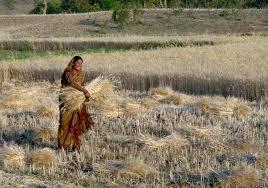Bihar: Reverse Migrants Engage in Rabi Harvest to Earn Livelihood

Representational image. | Image Courtesy: Wikimedia Commons
Patna: The nationwide lockdown came at a tricky time for farmers, with the Rabi crop ready to harvest. Arun Manjhi, Dina Paswan, Mukut Yadav and Lakhendar Prasad are all migrant workers who returned to their native villages in Bihar after the lockdown began. The four men have something in common, that they are land less and have started working locally as farm labourers to earn their livelihood. It has come as a blessing for marginal and big farmers during the harvest period.
Left with no option after returning, Manjhi, Paswan, Yadav and Prasad, residents of different villages in Muzaffarpur and Vaishali districts, have joined other local farm labourers to work on the harvesting of Rabi crops, namely wheat, oil seeds and pulses, to earn their livelihood. At the moment, they are happy to work in the field, either in their own villages or in neighbouring villages.
The aforementioned four may have been lucky and part of a small number who chanced upon an opportunity to earn their livelihood locally after getting back home. According to reports from different districts, their numbers are growing as most of the migrant workers have to look for work to earn a livelihood now.
“There are dozens of migrant workers now engaged in harvesting work as there is no other source of livelihood. We have to work to earn something to survive. There has been no help from the local administration and the state government or the central government till date,” said Arun Manjhi, who had returned to his native village under Bochaha block in Muzaffarpur from Hyderabad in the last week of March.
Dina Paswan, who returned from Bengaluru, said they could not sit idle any longer and he decided to start working in the farms last week. “We have occupied ourselves by harvesting wheat using our hands,” he added.
Like Arun Manjhi and Dina Paswan, Mukut Yadav and Lakhendar Prasad are also working day and night to harvest standing wheat crops in the neighbouring Vaishali district. “We are lucky that we got work soon after we returned home. We have been manually cutting wheat crops in the field during the day and work on thrashing machines in the evening and night,” Yadav said. The machines are in overdrive to finish harvesting in the state before the mercury hits 40 degrees Celsius. Yadav returned to his native village in Vaishali from Mumbai on March 26 in a special train.
Jogendar Mahto, a local farmer who owns nearly four acres of fertile land in Vaishali, said that a large number of migrant workers are working in the ongoing harvest work. “It is good for them and for us. They are earning a livelihood and we got relief from the labour crisis,” he added.
Gopalji Trivedi, a well-off landed farmer from Matlupur village under Bandra block in Muzaffarpur, said the return of migrant workers to rural Bihar is like a blessing in the time of the coronavirus crisis. “There is no doubt that the arrival of migrant workers has ended the labour crisis in agriculture, particularly for harvesting. At present, there is no shortage of farm labourers thanks to the returning migrant workers,” said Trivedi, also an agriculture scientist and former vice-chancellor of Rajendra Prasad Central Agriculture University at Pusa in Samastipur, Bihar.
Trivedi, who is in his early 80s, lives by himself in his native village and looks after agricultural land. He expressed happiness over the return of the worker migrant workers. “If their hard labour and agricultural skill is properly utilised, it will boost productivity in the state and increase income in rural areas,” he added.
However, R.K. Sohane, Director Education Extension at the Bihar Agriculture University at Sabour in Bhagalpur district, said that while it was a positive development, he added that there was still a sense of fear among locals that migrants may be carriers of COVID-19. “It may take some more time for them to break the psychological barrier as migrant workers have been wrongly painted as potential carriers of the coronavirus infection,” he added.
According to government officials, after Chief Minister Nitish Kumar issued directions to create opportunities for poor labourers ,especially migrant workers, the government has been planning on starting work on big infrastructure projects, employment schemes, the much-hyped ‘Jal Jeevan Hariyali’ mission to create water bodies and other work.
Sandeep and Shankar Manjhi, who returned from Goa and Delhi respectively, earn between Rs 250 and Rs 300 by working as farm labour for harvesting work. “We at least got some work here. It is better to work than wait for the government’s relief package to reach to us,” Sandeep said.
Shankar said he used to earn Rs 600 per day by working in Delhi, but the amount has been halved here. “But this is not bad, we will not starve and will save some money to survive the summer and ahead of the monsoon period when work for the Kharif season work will,” he added.
Hulas Ravidas, who had been working at a brick kiln in Uttar Pradesh, returned with the hope that the government will provide aid. Left disappointed, and having to manage his family of seven, he joined other farm labourers for harvesting work. His neighbour, Moti Ravidas, who returned from Tamil Nadu, is also earning from harvesting work. “Everything is shut; there is no work other than harvesting. It is easy to work locally as farm labour by maintaining social or physical distancing as advised by the government,” he added.
In the last week of March and in early April, reports had mentioned that migrant workers were not welcome back home due to fears that they were carriers of the novel coronavirus. However, such incidents have not been reported over the last week or so.
According to government data, more than 1.8 lakh migrant workers returned to Bihar after the lockdown began. Unofficial figures doing the rounds say more than 3 lakh migrant workers returned to Bihar after March 22.
Get the latest reports & analysis with people's perspective on Protests, movements & deep analytical videos, discussions of the current affairs in your Telegram app. Subscribe to NewsClick's Telegram channel & get Real-Time updates on stories, as they get published on our website.
























